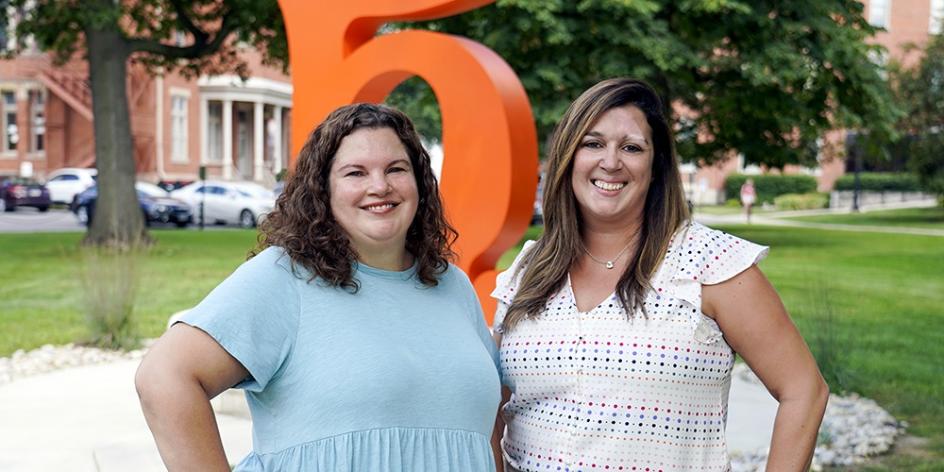
The faculty and students in Heidelberg’s Master of Arts in Counseling program are getting super SMARTT.
MAC faculty members Dr. Robin DuFresne and Dr. Meagan McBride recently received word that a $990,000 grant they authored – Serving Marginalized Adolescents in Rural Towns Training, or SMARTT – has been fully funded for 2023-25 by the Health Resources & Services Administration (HRSA). Heidelberg’s MAC program is the only program in Ohio to be awarded this grant.
The overarching goals of the grant include adding, expanding and fostering the development of clinical sites that serve children, adolescents and young adults in rural settings, where mental health services are often underserved.
And the objectives are lofty and very exciting. The grant funds will directly support students, internship supervisors and training. Ultimately, through the life of the project, MAC looks to have 90 percent of its graduates employed in underserved or rural communities.
“The project aims to fund, train and graduate 43 new behavioral health professionals over a two-year time period and support a minimum of 43 current supervisors in their competencies in culturally competent care for underserved, marginalized and rural youth and adolescents,” Meagan said.
When the grant funding concludes in two years, MAC aims to increase the number of counselors with their supervisor designation by 10 in the first year and 20 more in the second year.
“We’re very excited to be able to support our students in this manner,” Robin said. Additionally, this opportunity will increase the number of skilled clinicians and supervisors in the region as we are able to provide professional development options to our partner agencies.
Benefits for MAC students
The grant will provide $15,000 stipends for paid internships for MAC students as well as funding for them to complete telehealth training to qualify to be Board Certified Telemental Health Professionals. Additionally, funds also will be available to students to attend the All Ohio Counselor Conference. In exchange for the support, each student will commit to working at least 30 hours of their required internship with children, adolescents or young adults.
Benefits for the community
In addition to supporting students, the MAC program will provide community support too. Each internship site supervisor who supervises a MAC student will receive a stipend and will also be funded to attend the All Ohio Counselor Conference as well. Additionally, MAC will create a Supervisor Summit that will provide 24 continuing education hours (CEU) of supervisor training over two years to meet state requirements to earn the supervision credential.
Benefits for MAC faculty
Faculty members who teach in the MAC program will be able to attend training sessions that focus on supervision and working with children and adolescents. “The training will ensure that we are able to infuse our courses with the most recent evidence-based information,” Robin explained. Additionally, the faculty will complete a diversity certificate to increase our knowledge base in areas of diversity, equity and inclusion.
Continued commitment
The multi-faceted approach of supporting students, faculty, counselors and site supervisors aims to reduce the critical shortage of mental health providers in Ohio, specifically targeting those able to serve underserved, marginalized and rural youth and adolescents.
Heidelberg already has a strong record of placing graduates in Health Professional Shortage Areas (HPSA). Based on 2021-23 graduation placement statistics, MAC has placed nearly 94 percent of its graduates in HSPA-designated regions and 62.5 percent of its graduates in Health Resources & Services Administration-designated rural regions.
This is the second HRSA grant the MAC program has been awarded in the last 10 years. The MAC program is excited to continue this pattern of seeking funding to benefit our students and the wider community.
The Health Resources & Services Administration Grant Award to Heidelberg University (Serving Marginalized Adolescents in Rural Towns Training) will fund this two-year project at Heidelberg University, starting no sooner than September 30, 2023, and concluding no later than September 29, 2025. The total grant award is $990,941.86, financed at 100% with federal money and 0% financed by non-governmental sources.